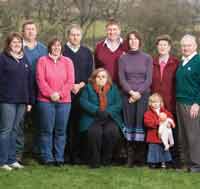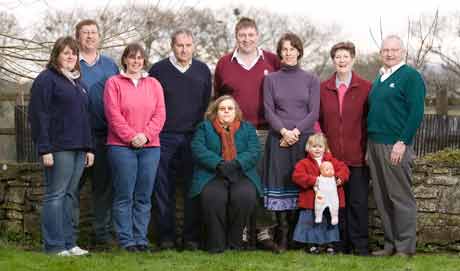Farming Families: The Alvises of Somerset

We’re near Bristol for the latest article in our monthly series profiling farming families who pull together as a team to achieve business success.
The Alvis family have been farming in the Redhill area of Somerset’s Mendip hills for generations.
Managing numerous businesses successfully is not for the faint-hearted. But they’re relishing the challenge and the business is thriving in the face of economic change.
At least nine members of the family are involved in the running of the three dairy herds, the pig unit, arable enterprises, cheese processing business and farm shop, which now employ 110 people overall.

It all started back in 1952, when John Alvis’s father and uncle, John and Sam Alvis, joined forces to make cheese from their own dairy. They bought a pig herd to provide an outlet for the whey and supplied the cheese unit with milk from their 200 dairy cows. But after just eight years the brothers fell out, and John Snr bought the business.
“He grew the business steadily, and I joined it in 1960 when I left school,” says John Jnr, who is one of at least seven generations of John Alvises, including his son Johnny and grandson John.
John gradually took on more responsibility, and became managing director in his 40s, when his father became chairman. Over the years he has built up the farm to 4000 acres, half of which is owned, with more than 1000 dairy cows and up to 12,000 pigs at its peak.
In the 1960s, Alvis Bros started buying in surplus milk, but when the Milk Marketing Board dissolved in the late 1980s, the milk price soared and the family returned to just using their own supplies. To improve margins, they started to look into organic cheese production and developed a new brand, Lye Cross Cheese.
“After a very slow start organics began to take off and in 1993 we convinced Sainsbury’s to stock our organic cheese,” says John. “We never got it right – we either made too much or too little, and it still happens today to some degree.”
After one particularly tight period, Sainsbury’s agreed to guarantee both price and volume for five years to encourage more farmers to convert to organic milk production. “That was a great boost and it encouraged us to invest in a new cheese dairy in 2000. It’s fashionable to knock supermarkets, but I’ve enjoyed our relationship with Sainsbury’s and it’s been very positive for this business.”
Alvis Bros is now the UK’s largest producer of organic cheddar. It is Sainsbury’s primary organic cheese supplier, providing more than 90% of its hard organic cheese. The family also source other cheese for the supermarket, and sell their own organic and conventional product through their farm shop and to local caterers and restaurants.
“It’s difficult opening up new markets, there’s rather too much cheese around, so it’s very competitive. We are seeing a slight move away from premium and organic to lower-priced products in the current climate,” says John. “However, organic has opened up more doors for us.”
The firm now makes 2000t of organic and 1000t of conventional cheese a year, using all their own milk plus bought-in milk from a further 4000 cows. John’s younger son Peter oversees all the dairy operations, including acquiring the milk, and managing the making, packaging and distribution.
His older son, Johnny, runs the largest dairy unit, Regilbury Park Farm, with 450 cows plus followers. He hopes to expand later this year to 600 cows, continuing the move towards larger dairy units.
“At one time we had five dairy herds, but we found that 200 cows was not terribly profitable, so we reduced the number of herds and made them bigger. I think that trend is likely to continue.”
As well as Regilbury, the family runs 350 cows at Box Bush Farm and 250 organic cows at Ham Green Farm, each under individual management.
They also have a 1700-acre arable enterprise and a joint contracting business with former employee Daniel Harding. All the dairy cross beef youngstock are finished and sold through the farm shop.
“We are very keen on unit management, so each individual area of the business is divided off, and we can get accountability for each section of the business,” says John. The farms sell to the dairy division, which then sells on to the farm shop or other retail destinations. “It gives us an accurate account of who is responsible for what, and what the costs are in each area, which is really important.”
It is also essential to give each family member their own area of responsibility, he adds. “If you want to make somebody feel that they own their own patch of the business you have got to give them responsibility. I have absolutely no problem in delegating. We need each of these managers lying awake at night worrying how to make it better, not me. There’s also got to be a lot of tolerance and transparency they’re really important factors.”
John, Johnny, Peter, and John’s brother Michael, who has a less hands-on role in the business, are all directors of Alvis Bros, and, therefore, benefit directly from each other’s success. “Each is fully aware of how important the other is to the balance of the company. The integration of the business is the key to its success.”
Although the cheese has carried the farming side of the business for the past 10 years and, therefore, enjoyed the most investment, John anticipates a turnaround in agriculture’s fortunes in the coming years.
Having recently run down the pig unit due to lack of profitability, he is open to the idea of buying in more finishers in the future, should the finances look attractive. But the cheese unit now has its own whey processing plant, so pigs are no longer essential to complete the cycle by providing an outlet for the waste product.
The whey processor extracts proteins for use as food ingredients, and lactose for animal feed, leaving clean water for reuse in the unit. “That means we are no longer dependent on pigs, so they will have to prove their worth to stay on site.”
In the future, the family also hopes to move and expand the farm shop, which they set up in 1983. “When I was a lad, people used to come into the cheese dairy and we would cut off a slice of cheese for them,” says John. “The farm shop evolved from there.”

The Alvis family has been managing change for generations
In 1998 they revamped it, and Michael’s daughter Harriet is now in the process of taking over the management of the shop, while separating out from the van sales and deliveries to local businesses.
“We will get better transparency over what margins we make in what areas,” says John.
When the economic climate starts to improve, they plan to relocate the farm shop to a nearby 10,000sq ft site, and develop a visitor destination with a café, rural retailers and other attractions.
While all main business changes and capital investments are decided upon as a family, the day-to-day running of each venture is left to the individual manager. Regular meetings ensure the £20m business continues to run smoothly, and the family have no qualms about bringing in outside expertise.
“We seem to be born with a production gene in our blood, not a sales and marketing gene,” says John. “Ownership and management of a business are two very separate issues and if there are areas of the business that any member of the family is not happy managing it’s a grave mistake to force them to take it on. It undermines family relationships. It’s much better to employ somebody else to do that job.”
Johnny admits he is passionate about the farming side of the business, while Peter is far more interested in the cheese venture. By working on these strengths, and recognising weaknesses, the Alvis family manages to bring a wide range of enterprises into a happy and prosperous whole.
Of course, they are all supported by their wives Jo, Di, Sarah and Pauline, who, as well as helping with their respective sides of the business, are busy bringing up the next generation of Alvises to take on the reins. “Family businesses depend entirely on the relationship between families and we are very fortunate,” says John.
The Alvises are also encouraging the younger generation of schoolchildren to learn more about farming and the countryside. Two years ago they set up Farmlink, which has now developed into a charity to brings kids on to farms as part of the curriculum, to learn about where their food comes from.
This year it will enable 10,000 children to visit a farm and John’s wife Pauline helps to educate the older generation by giving 20-30 talks a year to groups like the Women’s Institute.
“As cheese producers, we are inevitably closer to our consumers, and it became very apparent that there was a tremendous lack of understanding about what goes on in the countryside,” says John. “We were never going to win hearts and minds without doing something to redress that balance.”
As a non-executive director of four other businesses, and soon to be High Sheriff of Somerset, John is now planning to take more of a back seat in the business.
“I’m looking desperately to hand on responsibility to the next generation,” he says. “The thing that gives me the greatest satisfaction is seeing the next generation, throughout the business, picking up the cudgels and running with them. I can see a team of young people really prepared to push it on.”
- More Farming Families



